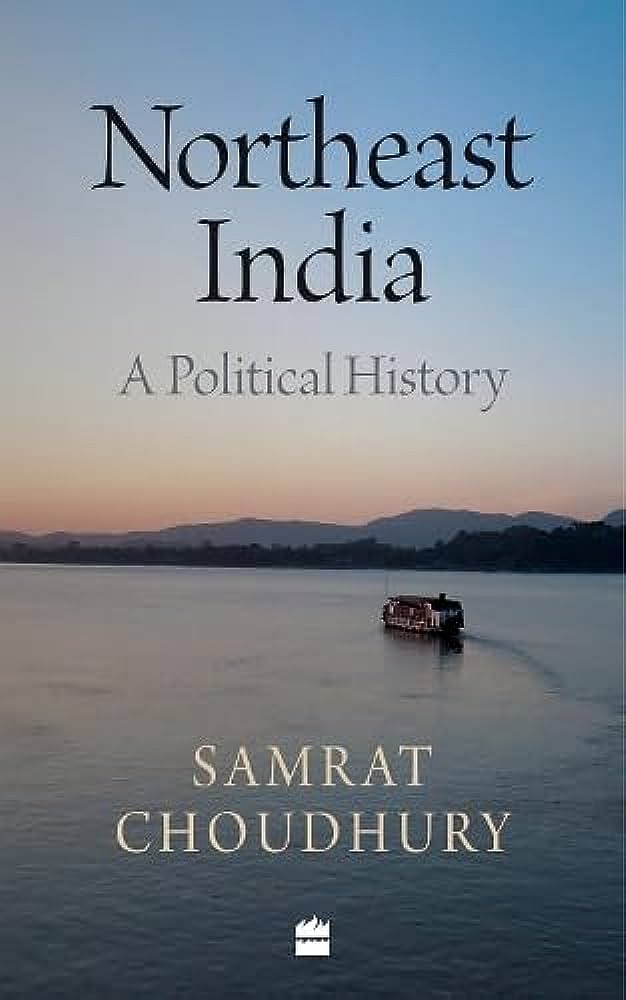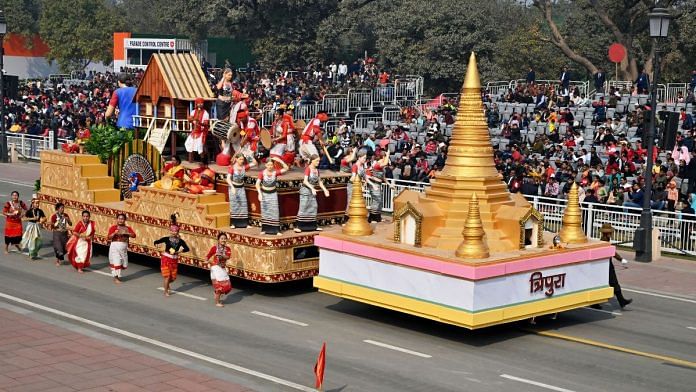The Instrument of Accession had left Tripura with control of everything except defence, external affairs and communication. This last, communication, immediately became a huge problem for the state after partition. From being a strategically located outpost connected to the world through the port of Chittagong, it now found itself in a far corner of the new state of India, not connected to any other part of the country by land. In this situation, a local mahout-turned-businessman, Gedu Mian, who had floated a pro-Muslim League political party called the Anjuman-e-Islamia, began canvassing support for the merger of Tripura with East Pakistan. To counter this, by mid-November 1947, several rival militia groups were set up across the state. The Congress and Communist Party—usually bitterly divided over everything—joined hands with an anti-Pakistan Muslim organisation, the Tripura Rajya Praja Majlish. A Kirit Bikram Rakshi Bahini ‘resistance force’ was formed to intimidate the Anjuman-e-Islamia and make sure Tripura didn’t fall to Pakistan. As the situation worsened, the Maharani dissolved the regency council, made herself sole regent and flew to New Delhi ‘to secure Indian help to abort a possible Kashmir-type operation in Tripura’. Sardar Patel assured her of full military support from the Indian government, and soon after, the Governor of Assam, Akbar Hydari, arrived in the state. Finally, on 11 November 1947, the Maharani announced ‘The Accession of this state to the Dominion of India’, which had apparently been ‘decided by the late ruler after due consideration and full consultation with all sections of the people’. In September 1949, Maharani Kanchan Prabha Devi signed the Merger Agreement by which Tripura state merged into the dominion of India. As a result of this, from January 1950, along with Manipur, Tripura became a chief commissioner’s province, administered by an officer of the Government of India.
There was only one significant flicker of rebellion against the merger that brought about the end of the ancient princely state. A member of the royal family and the dissolved regency council, Durjoy Kishore Dev Barman, led the formation of a militant tribal organisation called Sengkrak, or ‘clenched fist’, to oppose the merger of Tripura with India. It also spearheaded a movement called Bangal Kheda, which translates as ‘drive out the Bangals’—meaning the Bengalis of East Bengal origin. Sengkrak was the first open manifestation of the strong anti-refugee sentiment, overlapping with anti-Bengali or anti-Bangladeshi feelings, that still remains a potent force in the politics not just of Tripura but of all Northeast India.
The refugees themselves were hardly there by choice, and their situation in the refugee camps in Agartala was grim. ‘One refugee committed suicide on the 10th July 1950 in Durgabari Camp near the Maharaja’s Palace. It was learnt that the deceased could not secure food or money from the Relief Officer. Next day, another refugee was reported to have died of starvation at the Maharajganj Camp’, historian Anindita Ghoshal wrote in a paper, citing an intelligence report from 1950. According to Ghoshal, a number of organisations for the relief of refugees had begun work among them, including some with strong political affiliations. They spanned the political spectrum from left to right. The Bharatiya Jana Sangh leader, Syama Prasad Mukherjee, first talked about the amalgamation of these groups and advised them to fight through a common political platform. Accordingly, a Tripura Central Relief Organisation was formed, which set down a charter of eighteen demands including speedy resettlement and voting rights.
It was, however, the Communists who managed to garner support across communities. They had abandoned the path of armed struggle by 1951, and entered electoral politics. The first elections to the Indian parliament were held in 1952. Tripura had two seats in the Lok Sabha, or lower house of parliament, for which direct elections were held. Biren Dutta of the Gana Mukti Parishad, who contested on a Communist Party of India ticket, won by a wide margin in the Tripura West constituency. Prince Durjoy Dev Barman, contesting as an independent candidate, finished a distant second, while the Congress and the Hindu right-wing Bharatiya Jana Sangh brought up the rear. Dutta’s colleague Dasaratha Deb of the GMP, the leader of its armed wing, also on a CPI ticket, won the other seat, Tripura East, with similar ease. The Congress candidate, Sachindra Lal Singh, who as a student had been associated with the underground Jugantar movement, was second, and the Bharatiya Jana Sangh third. At the time he became member of the Indian parliament, Deb was wanted by the police, and was arrested in Agartala soon after. Although he was released on bail within hours, his arrest raised an issue of parliamentary privilege. Deb’s written statement to the Privileges Committee explained the background of the case in which he had been held:
Three men had allegedly been kidnapped—Rajani Bidyaratna, President of a society called Swasti Samiti, Dayananda Baidya and Nandalal Nath… The S.P. further told me that there was a conflict between the local tribal people and the said Swasti Samiti over some land disputes. The Samiti, it seems, had taken a lease from the Tripura Government and evicted about 500 tribals from their land.
The kidnapped men, representing a cooperative society working for the welfare of displaced Bengali refugees, had been held in captivity for almost a month before being released. Deb was arrested in connection with their kidnapping. He denied knowledge of the case.
 This excerpt from Northeast India: A Political History by Samrat Choudhury has been published with permission from HarperCollins India.
This excerpt from Northeast India: A Political History by Samrat Choudhury has been published with permission from HarperCollins India.



